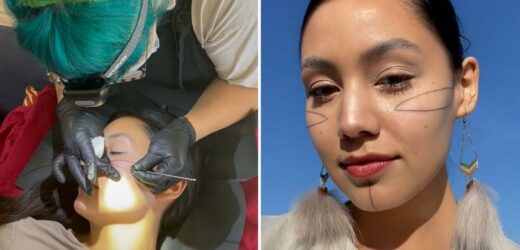AN indigenous activist got her first tattoos on her cheeks and they cannot be taken at face value.
Shina Novalinga, 24, has triangular shaped markings over her upper cheek bones and another vertical line going down her chin.
Mum Kayuula also got the same face tattoo and Shina plans to get more tattoos like it this year.
The marking are traditional for Inuits – indigenous people from Alaska, Canada and Greenland.
Shina, an Inuk from Canada, wrote in December after she got them: "A lot of people told me I would regret it and that it would ruin my face, my 'beauty'.
"I don't think so."
Shina used a traditional hand-poking method for her tatts.
They often broadly symbolise womanhood, but each marking has its own significance to the individual. Shina has not revealed the meaning of hers.
She used the #womanhood hashtag and Emmy Meli's song I Am Woman as a backing to a TikTok video of her tattoos.
Some Inuit girls would traditionally get the line down their chin as their first tattoo when they start menstruating.
Other markings would be added when they reached a new skill or milestone. The custom was abolished by Western colonisers.
Most read in News
DISINFORMATION Live updates as Putin forces 'found 30 biological weapons labs' in Ukraine
Russians seen ‘massing’ near Kyiv as Ukrainians fortify ‘every street & home’
Girl, 3, choked to death on dad's Nike toggle at Asda in tragic accident
Moment triple killer walks with pregnant victim before he raped & murdered her
Social media personality Shina, who has collaborated with brands like Boss and Elle, has used platforms like TikTok and Instagram to spread awareness of her culture.
She previously told how she would draw them on her face before they were ask permission to have them for any photoshoots she did.
She wrote: "I never thought it would be a sensitive topic. Now I am proud to wear them everyday and work with brands that celebrate my tunniit, a part of my identity as an Inuk woman."
Shina, a throat singer, has also previously claimed someone told her: "Let me go get a rag and remove the dirt from your face."
Shina said she explained their significance, adding: "Thinking about what my ancestors, grandparents, great grandparents had to go through.
"I stand by them."
Source: Read Full Article









